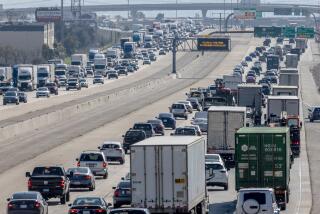Draft Report Links Cancer, Diesel Exhaust
Lending federal weight to a controversy already rolling down California’s freeways, the Clinton administration has quietly issued a draft report linking diesel exhaust to lung cancer and other respiratory ailments.
A state report due later this month is expected to recommend that the exhaust be listed as a carcinogen.
Taken together, the two studies would add fuel to the debate over whether emissions from trucks, buses, diesel-powered cars and locomotives should be further reduced.
But the prospect of new restrictions, stemming from the study by the U.S. Environmental Protection Agency, prompted immediate objections Thursday from a leading representative of California’s business community.
“The only thing you could do is eliminate diesel . . . without having a replacement. I don’t think you can do any more without totally disrupting the economy and public services,” said Allan Zaremberg, president of the California Chamber of Commerce.
While acknowledging that studies of the emissions’ impact on animals provide clearer results than those dealing with the effects on people, the federal report says:
“It is clear that too much exposure [to diesel exhaust] increases the likelihood of non-cancer respiratory system damage or the risk of lung cancer, and thus we say diesel exhaust at some level of chronic exposure poses a respiratory hazard for humans.
“As the total exposure over a lifetime increases, basic respiratory functions can be impaired, and there is a probability . . . that lung tumors may appear later in life.”
In addition, the report suggests that young children’s “episodic or frequent exposure” to the exhaust could increase their susceptibility to such diseases, thus disproportionately increasing their lifetime risk.”
The study was prepared over several months and was posted without EPA announcement on the agency’s World Wide Web site. The report will be subject to agency review, public comment and possible revision before becoming final.
Questions about diesel exhaust’s contribution to cancer and respiratory disease have consumed California air quality officials for years. Toxicologists across the country had linked the exhaust to cancer but had not determined what level of exposure is dangerous.
The upcoming state report, prepared by a scientific board and due for release April 22, will be relayed to the California Air Resources Board. If the board accepts the scientists’ recommendations and declares diesel exhaust to be a toxic substance, the agency will be required to propose steps that would reduce the public’s exposure to it.
That is where the trouble starts.
Diesel exhaust is ubiquitous. Vehicles powered by the fuel spew fumes on freeways, suburban and city streets and across farmlands.
And while diesel engines in automobiles have never been very popular, most products enter the state aboard diesel-powered trucks or trains--and many children ride to school on diesel-powered buses, Zaremberg pointed out.
The noxious emissions from diesel engines have sparked efforts to control them, even as the engines’ fuel efficiency has been touted as an answer to another pollution problem.
Richard Wilson, the acting assistant EPA administrator for air and radiation issues, said agency standards have reduced diesel truck and bus emissions by 90% from those given off by previous models.
“Diesel engines are more fuel-efficient today than ever, helping the nation reduce the pollution that contributes to global warming,” he added.
Diesel is one of the most regulated compounds in California, because of its contribution to smog and soot. The fuel has been reformulated to reduce sulfur. State and federal standards have forced reductions in smog-forming emissions from diesel engines not only in trucks, buses and locomotives but also in tractors, industrial generators and other sources.
Thus, major new technologies, among them advances in alternative fuels or in the design of the engine itself, might be required to achieve further reductions in emissions.
“In the short term, there is probably very little that can be done that’s not being done already. We already have the cleanest diesel fuel in the world,” said Jerry Martin, the Air Resources Board spokesman.
Gerstenzang reported from Washington and Cone from Los Angeles.
More to Read
Start your day right
Sign up for Essential California for news, features and recommendations from the L.A. Times and beyond in your inbox six days a week.
You may occasionally receive promotional content from the Los Angeles Times.






